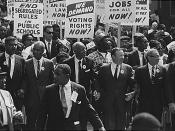"Coming of Age in Mississippi" is the 1968 autobiography of author Anne Moody's maturity from a child, to a high school and college student, and then into an active participant in the civil rights movement. Moody portrays her black family living in the rural South and her involvement with such groups as the NAACP and the CORE. She ends her novel with an ambivalent tone that conveys her insecurity about the future of the movement. Throughout the book, Moody leaves clues as to why she feels such uncertainty. Fear and lack of involvement by the vast majority of Negroes, numerous discouraging murders that pro-segregationists used as messages to the civil rights activists, and the reluctance of the US government to end segregation (along with the unsuccessful helplessness of the civil rights organizations themselves) are the main reasons that Moody leaves readers with this tone of ambivalence and uncertainty for the future of the civil rights movement.
One very important reason for Moody's ambivalence is the lack of motivation common among the majority of Negroes during the civil rights movement. Most Negro women accepted their service occupations and low social standings because "whites always needed a cook, a baby-sitter, or someone to do housecleaning" and Negroes always needed the money, no matter how little, that these type of jobs provided (113). Even after a young Negro girl was raped by a white farmer while she was picking cotton for him, Negro parents were still left with no option but to send their children off to work for the white men.
"All the Negroes thought it was horrible, but none of them stopped sending their children to pick cotton. They had no choice--the little money the teenagers made from picking cotton kept them in school (324)."
Not only had these desperate...



This is Great.
Great! Well written essay for sure. Could you add a bibliography though? I would like to see what sources you used.
0 out of 0 people found this comment useful.